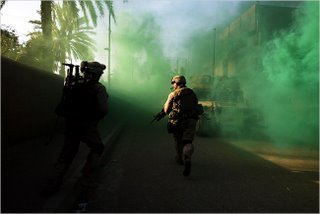
No, it's not Vietnam. The uniforms are tan
Holden of First Draft (and pony fame)
I haven't a clue as to why anyone would take the advice of Bill Kristol and Rich Lowry on how we should proceed in Iraq. Hell, I don't know why anyone would think either man was worth listening to, much less follow their advice.After all it was Bill Kristol who on April 1, 2003, smugly told an NPR audience:
There's been a certain amount of pop sociology in America that the Shia can't get along with the Sunni and the Shia in Iraq want to establish some kind of Islamic fundamentalist regime. There's been almost no evidence of that at all, Iraq's always been very secular.And it was Rich Lowry who, on April 27, 2005, gave us this famous magazine cover...
...which was accompanied by Lowry's sage evaluation of the situation in Iraq.
It is time to say it unequivocally: We are winning in IraqBut for some unknown reason the Wa$hington Post today felt it was important for us to hear the advice of two men who have been nothing but wrong on this issue.
There is no mystery as to what can make the crucial difference in the battle of Baghdad: American troops. A few thousand U.S. troops have already been transferred to Baghdad from elsewhere in Iraq. Where more U.S. troops have been deployed, the situation has gotten better. Those neighborhoods intensively patrolled by Americans are safer and more secure. But it is by no means clear that overall troop numbers in Baghdad are enough to do the job. And it is clear that stripping troops from other fronts risks progress elsewhere in the country.So, more US troops are what we need to make Iraq safer? It so happens that we currently have 145,000 troops in Iraq, the highest number since December and 15,000 more than a month ago.
Yet despite the pressence of 290,000 boots on the ground violence in Iraq has increased. In fact, a GAO report on the failure of the Iraqi political process released yesterday states:
In spite of a sharp increase in Sunni-Shiite violence, however, attacks on U.S.-led coalition forces are still the primary source of bloodshed in Iraq, the report found.That's right, the "primary source of bloodshed in Iraq" is the very existence of US forces there.
The GAO continues:
The report, citing the Pentagon, said that enemy attacks against coalition and Iraqi forces increased by 23 percent from 2004 to 2005 and that the number of attacks from January to July 2006 were 57 percent higher than during the same period in 2005.A graph showed that the number of attacks rose from around 100 in May 2003 to roughly 4,500 in July 2006. More than half of those were against coalition troops; the rest appear to have been split almost evenly between attacks on Iraqi security forces and attacks on civilians.
What of the Wrong Brothers claim that, "Where more U.S. troops have been deployed, the situation has gotten better," specifically citing Baghdad?
Well, despite the Pentagon's efforts to hide the troops by only counting deaths from a limited number of causes instead of all killings, things in Baghdad are no safer than before the recent influx of US forces.
Also Monday, the U.S. command said that the American military did not count people killed by bombs, mortars, rockets or other mass attacks -- including suicide bombings -- when it reported a dramatic drop in the number of murders in the Baghdad area last month.The decision to include only victims of drive-by shootings and those killed by torture and execution allowed U.S. officials to argue that a security crackdown that began in the capital Aug. 7 had more than halved the city's murder rate.
But the types of slayings, including suicide bombings, that the U.S. excluded from the category of "murder" were not made explicit at the time. That led to confusion after Iraqi Health Ministry figures showed that 1,536 people died violently in and around Baghdad in August, nearly the same number as in July.
Here's a hint, when you're fighting to control a captial, you are NOT winning. When you know the minute you leave, you lose control, you're not winning. when you lose control of a vital province, you are not winning.
In short, we're not winning.
No comments:
Post a Comment